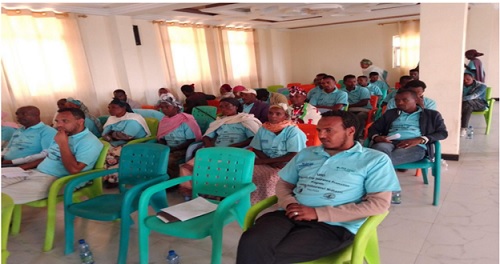
BY ABEBE WOLDEGIORGIS
Agriculture in Ethiopia is the foundation of the country’s economy, accounting for half of gross domestic product (GDP), 83.9 percent of exports, and 80 percent of total employment. Yet it is characterized by Subsistence, out dated mode of production, and less input utilization which resulted in less output. Moreover, when it faces extreme climate condition, farmers’ livelihood will be critically endangered and to sustain their life, they are forced to receive aid.
To tackle rural poverty and farmers’ vulnerability, the government, through partnership with the private sector and international none governmental organizations, introduced micro insurance service provision to the small scale farmers and so far, sizable number of farmers are benefiting and could withstand the problems they face due to crop failure.
Solomon Zegeye is a Manager, Agriculture and Micro Insurance Business in Nyala Insurance Company. As to him, climate change particularly, variability of weather affects smallholder women farmers the most.
Cognizant of this fact, SOS Sahel Ethiopia in partnership with Nyala Insurance company, arranged a pilot based multi- peril crop insurance in six rural kebeles of Dugda, Adami-Tulu and Bora districts of Oromia region under a project named “Gender Trans-formative Climate Smart Agriculture and Agri-Business” being funded by UN-Women Ethiopia Country Office. Smallholder women farmers under the project each insured half hectare of maize crop farm with 75 percent of insurance premium covered by the donor as premium subsidy while 25 percent of the premium is paid by women farmers.
He further said that among smallholder women farmers covered by crop insurance scheme, twenty four women farmers faced yield shortfall or loss of maize crop due to bad weather and related causes. Having assessed the losses at the farms, Nyala Insurance per its contractual obligation, settled the losses by handing-over the Cheque to the delivery channel- Metemamen Microfinance Institute (MFI) in a payout ceremony held at Meki town on June 24, 2022. The MFI distributed the payout to beneficiary farmers as per its role and responsibilities stipulated in the relevant agreement.
Some of the beneficiary farmers, after collecting payouts, gave their testimonial witnesses and said that the event has changed their view and understanding about insurance as what they witnessed has enabled them to build trust and confidence. They further said that they would continue buying insurance and inform other women farmers the importance of insurance service.
Representatives from UN-Women Ethiopia Office and SOS Sahel Ethiopia expressed their commitment and continued support to the on-going pilot program and to scale practical lessons of the pilot to other parts of the country.
Nyala Insurance, the pioneer of agricultural insurance from among private insurers in Ethiopian insurance industry, had worked and has been working in partnership with several international donors and development organizations in providing crop and livestock insurances in Tigray, Amhara, Afar, Somali, Gambella and Benishangul Gumuz regions since 2007 with total outreach of over 48,000 smallholder farmers and pastorals on a pilot basis.
As it is known similar to the sedentary farmers, pastoral communities are vulnerable to extreme weather condition and in the time of adversity due to the absence of rain the sector is critically affected. It is said Ethiopia has huge number of live stalk resource which is the first in Africa both in the high and law land parts of the country. But due to the traditional way of cattle rearing system, vulnerability to cattle diseases and shortage of water the contribution of the sector to the economy is negligible.
The per capita meet and milk consumption in Ethiopia is the lowest in sub Saharan African countries and this shows how the nation lags behind other countries in these regard.
In the last two years, the sector is critically affected by the drought which the nation had ever experience in the last 5o years. In the regions such as Oromia and Somali numerous cattle met their death in the wilderness.
In order to keep the livestock from the catastrophe, the Oromia Regional State took action by transferring the number of cattle from the drought affected areas to the less affected high land parts of the region. In the Borena area of the Oromia region pastoralists were forced to sell their drought affected animals with very less price in which left them to disadvantageous position. According to the National Disaster Risk Management Commission, rehabilitating the affected pastoral communities might take some years.
Hence, one can understand that the value of the provision of insurance service to the vulnerable segment of the society. Therefore, scaling up the service in various parts of the country is vital and to that end, enhancing awareness creation to pastorals and expanding saving culture is essential.
The Nyala Insurance Company reaffirms its commitment and readiness to work in partnership with donors, development partners and the government in the arrangement and provision of agricultural insurances to smallholder farmers and pastorals. It also provides agricultural insurances for commercial agricultural farm developers engaged in the growing and production of Coffee, Sugarcane, Tea, Cereals, Orchards (Fruits), and Vegetables, Pulses, Oil-seeds and Spice crops. Livestock insurance (cattle, sheep and goat) and poultry insurance are also other products provided by the company.
As it is known, 50 years ago, the drought phenomena appeared once in a decade but after the 1990s the nation has been experiencing in each two years. The cost of drought and extreme weather condition has been immense. Crop failure coupled with animal’s death has been a recurrent experience.
Land degradation, the clearance of forests and aggrandizing of grazing lands for the cultivation of farm land due to population pressure coupled with global warming and climate change left farmers and pastoralists highly vulnerable. Rehabilitating the affected community also cost the government in terms of finance. It also forced to look for foreign aid.
Therefore, the provision of micro insurance service to the affected people can be taken as a better way out.
The service plays crucial role for financial inclusion of the marginalized segment of the society. In Ethiopia, out of 100+ million people as compared to other developing countries, very tiny number of the population obtains financial service. The absence of saving culture in the rural community also has its own negative impact in this regard.
Integrating the rural community with financial service can pave the way for the flourishing of modern agriculture which utilizes significant amount of inputs.
To support the financial inclusion of the rural community, the government has been taking various measures and among others, the directives given to the banks to avail loan to the pastoral community by using their movable assets as collateral can be mentioned here. Those pastorals who secured loan enabled to purchase forage during the drought season and medical services. But as to the recently released report of the National Bank of Ethiopia due to unaware of getting loan from banks the number of borrowers is insignificant therefore, awareness creation work is essential.
According to the Ministry of Agriculture, more than 13 million household earns its living from agriculture but because of the subsistence nature of the sector only 15 percent of the product is supplied to the market. As to the economists, the current food inflation attributed to the shortage of supply. Hence, reaching the rural community with financial service in addition to protecting them from the impact of severe climate condition enables them to be surplus producers. Therefore, the ongoing partnership between public and private sector and none governmental organizations should be strengthened.
The Ethiopian Herald July 6/2022





